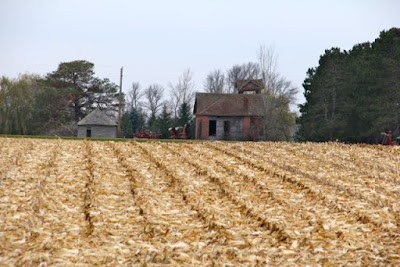 |
| harvested corn field
Photo by J. Harrington
|
I'm not unsympathetic to the plight of farmers, but I do wonder about a system that cycles from boom to bust, is heavily subsidized by public dollars, exempt from many environmental regulations, creates much of our water pollution, and still looses money? The "get big or get out" paradigm may be the worst advice ever to come out of the mouth of someone who said "I'm from the government and I'm here to help you." (Exceptions made for promises, followed by broken treaties, to Native Americans and any who believe the current national administration's almost total reliance on alternative facts.)
Farms got bigger, more capital intensive, people fewer. Small towns died, in part, because the business's farmer customers moved away as their farms became "consolidated." Now fewer farmers complain about limited markets, reliance on exports (helps our trade balance) and being controlled by international agribusinesses. Just about every farmer I've ever met was smart enough to realize that the first thing to do when you find yourself in a deep hole is to stop digging. I know that's easier said than done.
 |
| local farmers market
Photo by J. Harrington
|
Our family does its best to support local food producers. We shop at local coops and farmers markets. We've been members of a number of community supported agriculture farms. We like knowing where our food comes from and that it's been grown environmentally and raised humanely. Commodity row crops are an entirely different business as far as I'm concerned. Much of their product becomes feed stock for industrially-produced "processed foods" or non-critical biofuels.
Wendell Berry has written more, and more knowledgeably, than I about The Unsettling of America. A very simplified summary is that a good deal of the problem of agriculture is culture. Scott Russell Sanders does a wonderful job writing about the culture of the Midwest, we much of our agriculture is found, in his essays collected in Writing from the Center. The late Carol Bly brings attention to Minnesota's and other rural communities with her Letters from the Country and other works.
If you look at maps of the distribution of Republicans and Democrats, much of "America's Heartland" is Republican country. Those are the people who've brought us the Trump administration. Those are also the people who elect Republicans hell bent on destroying the Affordable Care Act and Medicaid, which may well destroy anything resembling a rural health care system. It seems to me that, once again, rural Americans have been taken in by a snake oil salesman and his accomplices in the GOP. It's time for rural America to "stop digging," and "diversify, or get out." Otherwise, will the last two Republicans in rural America please turn out the lights as you leave?
A telephone line goes cold;birds tread it wherever it goes.A farm back of a great plaintugs an end of the line.I call that farm every year,ringing it, listening, still;no one is home at the farm,the line gives only a hum.Some year I will ring the lineon a night at last the right one,and with an eye tapered for braillefrom the phone on the wallI will see the tenant who waits—the last one left at the place;through the dark my braille eyewill lovingly touch his face.“Hello, is Mother at home?”No one is home today.“But Father—he should be there.”No one—no one is here.“But you—are you the one . . . ?”Then the line will be gonebecause both ends will be home:no space, no birds, no farm.My self will be the plain,wise as winter is gray,pure as cold posts gopacing toward what I know.
********************************************
Thanks for visiting. Come again when you can.
Please be kind to each other while you can.
No comments:
Post a Comment